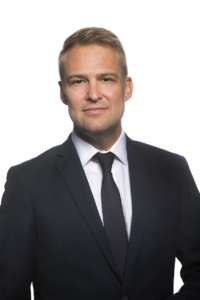Reyneke van Wyk, Head of Stonehage Fleming Investment Management South Africa
Focus on long-term opportunities amidst short-term volatility

Ongoing global market volatility and longer-term inflation pressures have many investors worried about what the year ahead means for their portfolio positioning and how it will impact their long-term investment strategy.
The evolution of geo-political tensions over the coming year could spell higher periods of volatility and have a meaningful impact on which markets emerge as leaders. As the current expansion transitions to ‘mid-cycle’ and inflation shifts up, we recommend investors stay focused on investments that are supported by this environment.
Navigate turbulent markets through selective positioning
While we are closely monitoring geopolitical developments, we maintain a constructive view on equities. Our expectation is for inflation to moderate and continued strong corporate earnings momentum, which is broadly supportive of risk assets. Equities are more attractive than bonds on a relative valuation basis, but it is also important to be selective within the equity market, as we expect further periods of increased volatility in the equity market, as the monetary conditions continue to tighten.
Within equities, we currently emphasise a blend of companies with strong pricing power to sustain margins, low valuation companies with competitive earnings that should deliver strong returns in a higher growth and inflation environment and the high growth leaders, which benefit from the tailwind of long-term megatrends.
For truly long-term investors, we expect those who are able to gain access to top tier private capital funds will benefit from the higher returns on offer in less liquid private markets.
Keep an eye on risk signals and trends
Key risks to monitor include the potential impact of a prolonged pandemic from future Covid variants, as well as accelerating inflation pressures, which may lead to faster policy tightening. Slower growth in China is also expected due to new regulations and the highly levered real estate market, while in the US, we are keeping a close eye on the underwhelming ‘Build Back Better’ programme. More importantly, at a global level we are monitoring escalating geopolitical tensions. These risks all pose a threat to global growth and risk appetite.
Get optimal offshore exposure
For years, Stonehage Fleming has advised client families to follow a disciplined and consistent approach to invest surplus capital offshore every year. This is primarily based on the advantages of a broader opportunity set and greater diversification. Looking from the outside in, as such a small contributor to the global economy, it does not make sense to invest the majority of one’s assets in South Africa.
Deciding on the ideal mix involves looking at what portion of an investor’s wealth and income is needed to meet lifestyle and business requirements in South Africa and what portion is considered surplus. This is a very personal process and will be different for each individual and family, taking into account factors such as total wealth, long-term strategy and risk tolerance.
Reduce risk with a phased approach
Our experience shows that informed investors who have followed a phased approach of investing surplus capital offshore have enjoyed significant additional growth to their investment portfolios and overall wealth.
We, therefore, advise against trying to time the currency when investing offshore, but rather recommend following a disciplined and consistent approach year after year, over a targeted time period, in order to reduce exposure to a single currency level as well as reduce the risk of emotional investment decisions.
Invest for the right reasons
It is critical not to invest offshore for the potential currency depreciation alone, but rather for the ‘right primary reasons’ which include risk diversification and access to opportunities not available in South Africa. Long-term devaluation of the rand as a structurally weak currency, in our view, is a secondary reason.
The market weakness in early 2022 presents another opportunity for advisers and investors to revisit an investor’s long-term needs and objectives. Discussions should be held around portfolio declines experienced compared to the agreed risk ‘budget’, the investor’s capacity for future declines and general risk appetite, as well as any changes in the investor’s time horizon or income needs as a result of the crisis.
Choosing an appropriate investment adviser is also an important consideration, with an alignment of interests, ‘on-the-ground’ experience and depth of resources among the key factors to consider.


